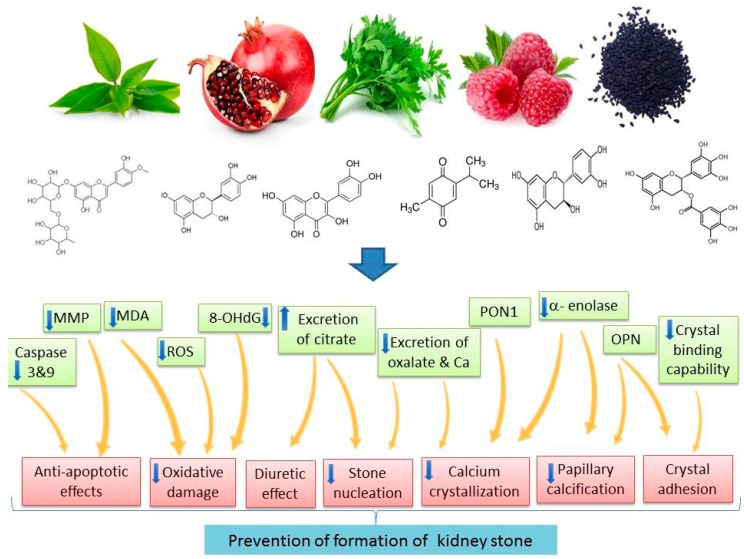Nirumand Mina Cheraghi, et al.
International journal of molecular sciences, 2018
Abstract
Kidney stones are one of the oldest known and common diseases in the urinary tract system. Various human studies have suggested that diets with a higher intake of vegetables and fruits play a role in the prevention of kidney stones. In this review, we have provided an overview of these dietary plants, their main chemical constituents, and their possible mechanisms of action. Camellia Sinensis (green tea), Rubus idaeus (raspberry), Rubia cordifolia (common madder), Petroselinum crispum (parsley), Punica granatum (pomegranate), Pistacia lentiscus (mastic), Solanum xanthocarpum (yellow-fruit nightshade), Urtica Dioica (stinging nettle), Dolichos biflorus (horse gram), Ammi visnaga (khella), Nigella sativa (black-cumin), Hibiscus sabdariffa (roselle), and Origanum vulgare (oregano) have received considerable interest based on scientific evidence. Beside these dietary plants, phytochemicals-such as catechin, epicatechin, epigallocatechin-3-gallate, diosmin, rutin, quercetin, hyperoside, and curcumin-as antioxidant dietary phyto-phenols were found to be effective for the prevention of urolithiasis (the process of stone formation in the urinary tract). The main underlying mechanisms of these dietary plants and their isolated phytonutrients in the management of urolithiasis include diuretic, antispasmodic, and antioxidant activity, as well as an inhibitory effect on crystallization, nucleation, and aggregation of crystals. The results as presented in this review demonstrate the promising role of dietary plants and phytophenols in the prevention and management of kidney stones. Further investigations are required to confirm the safety and efficacy of these compounds.
Keywords
dietary plants; kidney stone; natural dietary supplement; nephrolithiasis; phytochemicals; urolithiasis.
Conflict of interest statement
The authors declare no conflict of interest.Figures

Main mechanisms of action of dietary polyphenols in the prevention of kidney stones (Up arrow demonstrates increasing trend; down arrow demonstrates decreasing trend).
| PMID: | 29518971 |
|---|---|
| DOI: | 10.3390/ijms19030765 |
| PMCID (Free PMC Article): | PMC5877626 |
| Category: | Urinary Tract |
The best supplements with Camellia Sinensis, Rubus Idaeus, Urtica Dioica, Petroselinum Crispum, Punica Granatum, Nigella Sativa or Hibiscus Sabdariffa in Urinary Tract category:
- Kidney Cleanse, 90 Veggie Caps (Now Foods) - A healthy urinary tract is essential for maintaining the body's normal fluid balance and for cleansing the body of metabolic wastes. It contains among others: Urtica Dioica, Petroselinum Crispum.
Articles similar to "Dietary Plants for the Prevention and Management of Kidney Stones: Preclinical and Clinical Evidence and Molecular Mechanisms."
- The significance of Petroselinum Crispum for Urinary Tract: Botanical medicines for the urinary tract. (Four important categories of urologic herbs, their history, and modern scientific investigations regarding them are reviewed...)
- The role of Petroselinum Crispum in Urinary Tract: Evaluation of the Antibacterial Potential of Petroselinum Crispum and Rosmarinus Officinalis Against Bacteria That Cause Urinary Tract Infections. (In this study we evaluated the antibacterial activity of the crude hydroalcoholic extracts, fractions, and compounds of two plant species, namely Rosmarinus officinalis and Petroselinum crispum, against the bacteria that cause urinary tract infection...)
- The impact of Punica Granatum on Urinary Tract: Ethnopharmacological Survey of Medicinal Plants Practiced by Traditional Healers and Herbalists for Treatment of Some Urological Diseases in the West Bank/Palestine. ( Throughout history, every civilization in the world used plants or their derivatives for treatment or prevention of diseases... Our data provided that ethnopharmacological flora in the West Bank regions of Palestine can be quite wealthy and diverse in the treatments of urinary tract diseases. Clinical trials and pharmacological tests are required evaluate safety and efficacy of these herbal remedies. )
- The role of Nigella Sativa in Urinary Tract: Monitoring in vitro Antibacterial Efficacy of 26 Indian Spices Against Multidrug Resistant Urinary Tract Infecting Bacteria. ( To screen methanolic extracts of 26 commonly used Indian spices against nine species of uropathogenic bacteria (Enterococcus faecalis, Staphylococcus aureus, Acinetobacter baumannii, Citrobacter freundii, Enterobacter aerogenes, Escherichia coli, Klebsiella pneumoniae, Proteus mirabilis, and Pseudomonas aeruginosa), isolated from clinical samples of a tertiary care hospital for antibacterial activity... The most effective and unique 16 spice plants recorded for the in vitro control of MDR uropathogens could further be pursued for the development of complementary and supplementary medicine against MDR bacteria. )
Previous article
ω-3 Fatty Acids in the Prevention of Cognitive Decline in Humans.

























































